Home - Collecting Sea Glass
Collecting Sea Glass, Collecting Beach Glass, Finding Sea Glass
The Casual Collector versus the Serious Sea Glass Collector
Lin and I invite you to take a humorous few minutes to analyze what really goes into collecting sea or beach glass as opposed to just liking sea glass and picking it up while you are at the beach.
The ins and outs of collecting sea glass pretty much boil down to two parts:
- First: the emotional side.
- Second: intent, approach, and results.
These two areas, of course, are combined to form the experience of collecting sea glass.
Collecting Sea Glass - For Everyone?
Any person can walk down a beach and find sea glass. It's fun, it's good exercise, the whole family can participate, and it's like a treasure hunt - maybe you'll find a real sea glass gem worth bragging about!

However, many people get a lot more serious, and sometimes get hooked on this hobby. They go from being a casual collector to a real enthusiast, even fanatical, sometimes after just one or two experiences at the beach.
Be forewarned.
Collecting Sea Glass - What is the difference between the casual collector and the serious collector of sea glass?
Intent
 Casual Collector
Casual Collector- A casual collector goes to the beach for vacation, a family outing, to walk the dog, etc.
- The casual collector is there primarily for other activities.
- A serious collector goes to the beach with the express purpose of looking for sea glass. He/she arrives at the beach without having made plans to do anything else except look for sea glass.
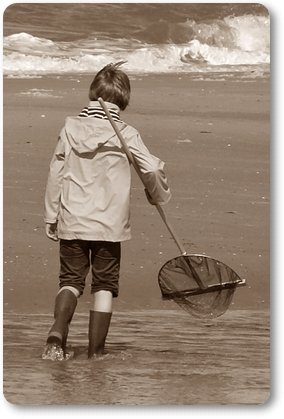 Serious Collector
Serious Collector- The serious collector is not there to enjoy the sun, scenery, family, or friends. He or she is there to find sea glass (if possible and weather permitting, of course.) A serious collector appreciates these other factors but they are not of primary importance).
- The serious collector will go to the beach rain, shine, snow, sleet, or hail; in fact, the casual collector thinks this is a little fanatical.
Approach
- A casual collector looks around as they are involved in watching the kids (or the parents), walking the dog, or hiking.
- When the casual collector finds a piece of sea glass, they admire it and put it in their pocket or give it to the kids (or to the parent, friend, dog, but hopefully not the baby).

- A serious collector arrives at the beach and immediately begins so scan the situation. He/she notes the tide (high or low, rising, or falling), the weather (whether to add or subtract clothes or put on the rain gear, etc), and as fast as possible begins searching in the likely spots.
- In fact, the serious collector has been seen scanning the ground in the parking area and paths before getting to the beach. This action is optional. He/she is not easily distracted.
- On reaching the shore, he/she will begin examining and collecting sea glass and cover many, many square feet of ground and will be, for all intents and purposes, lost to the world for long periods of time.
Results
On finding the sea glass, the casual collector may
- throw it back,
- give it to someone else,
- put in their pocket with their car keys, rocks, and shells.
- keep all the pieces they find regardless of whether they are extremely common and not tumbled or frosted. He/she doesn't know the difference and he/she doesn't have much sea glass anyway.

The serious collector will
- spot a piece and make a snap decision as to whether it is worth bending over.
- if worth the effort, he/she may rinse the piece, determine the color and the grade, and then decide whether it is a keeper.
- If the piece is somewhat unusual and the collector is not alone, there will be a quick consultation to establish the possible value for their collection.
- more than likely, the serious collector will toss the piece back; the current collection of similar non-rare pieces perhaps numbering in the thousands.
- if it is judged to be a keeper, it will be placed in a bag, pocket, or container where it is protected from possible damage by keys, rocks, dogs, or the baby.
- from time to time, the findings will be all pulled out and looked and admired. This keeps up the spirit of the hunt.

Is it a keeper?
- if it is judged to be a keeper, it will be placed in a bag, pocket, or container where it is protected from possible damage by keys, rocks, dogs, or the baby.
- from time to time, the findings will be all pulled out and looked and admired. This keeps up the spirit of the hunt.
On going home
- the casual sea glass collector is happy, tired, and sun or wind burned.
- the casual collector will put all the sea glass in a bottle, box, or drawer; eventually to the garage.
- then at an unknown year-end cleanup, it is taken to the dump with the kids' old marbles, rocks, bottles, and other misc uncollectibles.
- some rainy years later, the glass, along with whatever undecomposed trash is left, is washed down, down, down...to the beach, from whence it came.
- the serious sea glass collector is tired and sun or wind burned, but - here is a major and notable difference between the two - can be
- bummed out totally and depressed;
- just so-so and "oh, well," or
- ecstatic, screaming, bouncing off the walls and a real pain to be around.
- the serious collector will not just put the sea glass in a container.
- It may be sorted, grouped, categorized, labeled, photographed, mounted, or filed.
- It may be posted to a specialized blog, website, or socially bookmarked.
Collecting Sea Glass - Knowledge
Of course, in the long run, the difference between the serious and the casual sea glass collector is knowledge.
Yes, like most other serious avocations in life, collecting sea glass is based on a certain amount of knowledge. A serious sea glass collector has spent hours learning how to judge the value and rarity of what they're collecting and that requires research and time.
Times means not only time at the beach but also time perhaps at the library, over the internet, or conferring with other collectors.
However, there is no doubt that, as far as how to spend the most enjoyable time, a person who collects sea glass would much rather be spending his down time...down at the BEACH!
Collecting Sea Glass - Some Conclusions:
To become a serious collector of sea glass, the best use of your time is walking a beach.
So if one wants to become a serious collector one needs to start with identifying what type of beach would be most likely to yield sea glass.
You will also need to know what is worth keeping. A beginner at collecting sea glass has the tendency to keep every shard found. A collector knows what is valuable, whether to take it home with him or leave it in the waterline to become more tumbled.
Expand your knowledge with: Grading Your Sea Glass and learning the Rare Colors.
And if you are thinking of buying sea glass:
What is real or genuine sea glass?
What is tumbled or "man-made" sea glass?

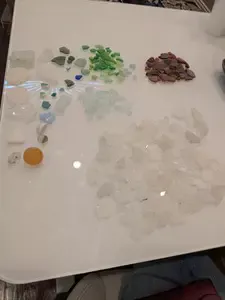
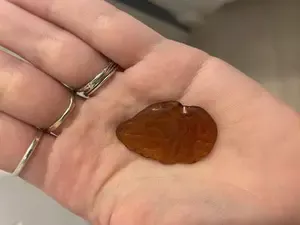


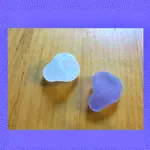
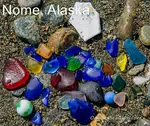

Comments!
We love receiving your comments, but please read the notes below before posting. Thank you!NOTES:
All comments are moderated. If you leave the page you won't see your comment until it is approved.
Select the "Post to Facebook" check box to be notified on FB when a reply has been posted.
If you scan the previous comments you may find an answer to your question. Click the "View X more" link at the bottom (if visible) to see all comments.
Photos - If you would like to include a photo, please use our Photo Forums.
Questions - If you have a question, it may already be answered. Please tap or click here to search of our site first.